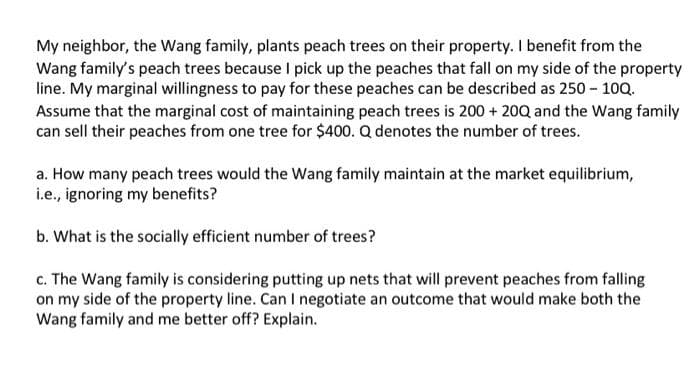My neighbor, the Wang family, plants peach trees on their property. I benefit from the Wang family's peach trees because I pick up the peaches that fall on my side of the property line. My marginal willingness to pay for these peaches can be described as 250 - 100. Assume that the marginal cost of maintaining peach trees is 200 + 20Q and the Wang family can sell their peaches from one tree for $400. Q denotes the number of trees. a. How many peach trees would the Wang family maintain at the market equilibrium, i.e., ignoring my benefits? b. What is the socially efficient number of trees? c. The Wang family is considering putting up nets that will prevent peaches from falling on my side of the property line. Can I negotiate an outcome that would make both the Wang family and me better off? Explain.
My neighbor, the Wang family, plants peach trees on their property. I benefit from the Wang family's peach trees because I pick up the peaches that fall on my side of the property line. My marginal willingness to pay for these peaches can be described as 250 - 100. Assume that the marginal cost of maintaining peach trees is 200 + 20Q and the Wang family can sell their peaches from one tree for $400. Q denotes the number of trees. a. How many peach trees would the Wang family maintain at the market equilibrium, i.e., ignoring my benefits? b. What is the socially efficient number of trees? c. The Wang family is considering putting up nets that will prevent peaches from falling on my side of the property line. Can I negotiate an outcome that would make both the Wang family and me better off? Explain.
Principles of Economics, 7th Edition (MindTap Course List)
7th Edition
ISBN:9781285165875
Author:N. Gregory Mankiw
Publisher:N. Gregory Mankiw
Chapter22: Frontiers Of Microeconomics
Section: Chapter Questions
Problem 6PA
Related questions
Question
100%
Plz solve A b& C, i vll upvote and give positive feedback ...you can give handwritten solution as well ...

Transcribed Image Text:My neighbor, the Wang family, plants peach trees on their property. I benefit from the
Wang family's peach trees because I pick up the peaches that fall on my side of the property
line. My marginal willingness to pay for these peaches can be described as 250 - 100.
Assume that the marginal cost of maintaining peach trees is 200 + 20Q and the Wang family
can sell their peaches from one tree for $400. Q denotes the number of trees.
a. How many peach trees would the Wang family maintain at the market equilibrium,
i.e., ignoring my benefits?
b. What is the socially efficient number of trees?
c. The Wang family is considering putting up nets that will prevent peaches from falling
on my side of the property line. Can I negotiate an outcome that would make both the
Wang family and me better off? Explain.
Expert Solution
This question has been solved!
Explore an expertly crafted, step-by-step solution for a thorough understanding of key concepts.
Step by step
Solved in 3 steps

Knowledge Booster
Learn more about
Need a deep-dive on the concept behind this application? Look no further. Learn more about this topic, economics and related others by exploring similar questions and additional content below.Recommended textbooks for you

Principles of Economics, 7th Edition (MindTap Cou…
Economics
ISBN:
9781285165875
Author:
N. Gregory Mankiw
Publisher:
Cengage Learning

Principles of Microeconomics (MindTap Course List)
Economics
ISBN:
9781305971493
Author:
N. Gregory Mankiw
Publisher:
Cengage Learning

Principles of Economics (MindTap Course List)
Economics
ISBN:
9781305585126
Author:
N. Gregory Mankiw
Publisher:
Cengage Learning

Principles of Economics, 7th Edition (MindTap Cou…
Economics
ISBN:
9781285165875
Author:
N. Gregory Mankiw
Publisher:
Cengage Learning

Principles of Microeconomics (MindTap Course List)
Economics
ISBN:
9781305971493
Author:
N. Gregory Mankiw
Publisher:
Cengage Learning

Principles of Economics (MindTap Course List)
Economics
ISBN:
9781305585126
Author:
N. Gregory Mankiw
Publisher:
Cengage Learning


Essentials of Economics (MindTap Course List)
Economics
ISBN:
9781337091992
Author:
N. Gregory Mankiw
Publisher:
Cengage Learning

Principles of Microeconomics
Economics
ISBN:
9781305156050
Author:
N. Gregory Mankiw
Publisher:
Cengage Learning